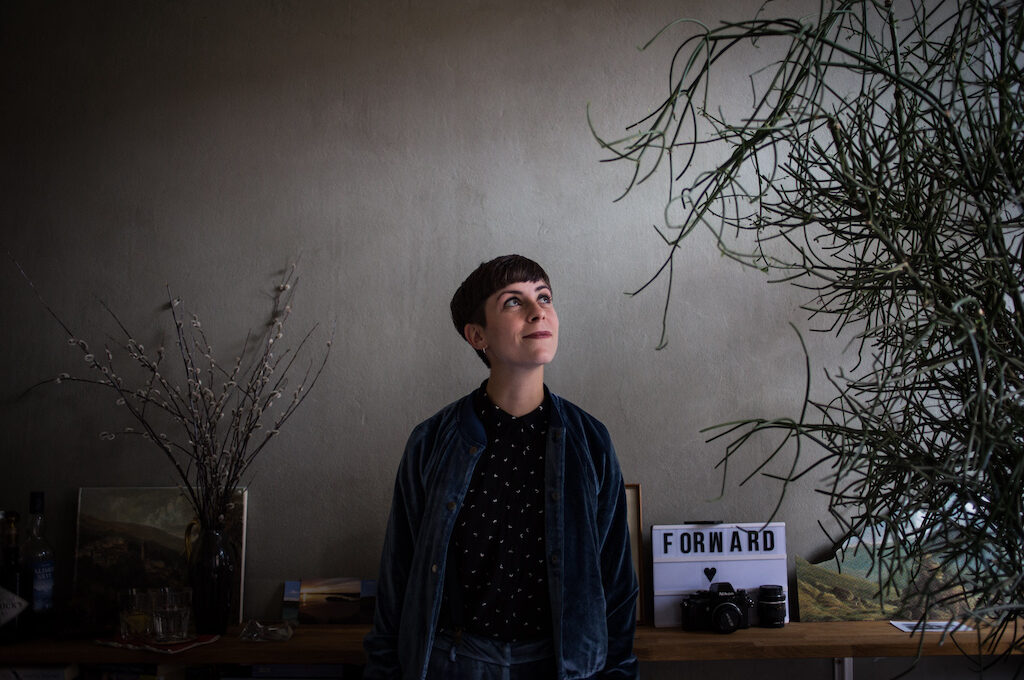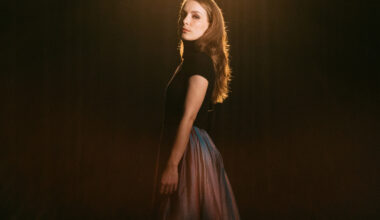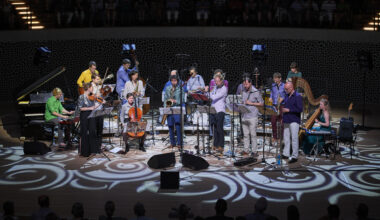It all started in Graz, home to an arts university internationally renowned as a hotspot for young jazz and classical musicians from Central and Eastern Europe. Laura Winkler (born 1988 in Styria) studied jazz voice in this lively, multicultural milieu, while beginning to pursue her burgeoning interest in composition. She released her first album with original music, Umami, as the leader of the quintet aura:L sculptures in 2010 . After finishing her bachelor’s studies with honors, she began a master’s program in composition under Ed Partyka. She transferred to the Berlin University of the Arts in 2012, where she continued studying under John Hollenbeck and Greg Cohen, and graduated – again with honors – in 2013. During this period she also founded the spirited, acoustically adventurous Wabi Sabi Orchestra. She remained in Berlin after finishing her master’s degree and still loves the city’s unique energy, openness and creativity.
A few months after her arrival in Berlin, Laura founded the international pop/jazz/folk band Holler my Dear. Known for its unconventional instrumentation, the band has since released three albums on the prestigious label Traumton Records. From their debut Have You Seen the Troll? to their latest album, Steady As She Goes, the sextet has consistently garnered enthusiastic reviews. The Frankfurter Allgemeine Zeitung praised Laura’s “humor and depth of meaning,”. Rondo Magazine wrote that “every piece builds inevitably to a hymnic climax with Winkler’s masterful vocals shining at the glowing core.” Austrian Radio Ö1 called it “music as antidepressant,” and the magazine Folker found that “progressive music doesn’t require electronic effects.” Other sources have applauded the “artistic, enjoyable pop” (mica – Music Austria) and the music’s borderlessness.
FACTS
1. Organizing Jazzwoche Berlin #3
2. Stay with the trouble! (Donna J. Haraway)
3. – in asking, knowing, caring, making a kin.
QUESTIONS
1. What is the biggest inspiration for your music?
I see music as a process of discovery, so I write to figure out what I think, to go deeper into a feeling, a question or a state. Inspiration can come from the most curious corners, from a color, a scent, architecture or a word. I make notes to access those even when I’m in the middle of the process.
2. How and when did you get into making music?
Apparently I was singing before I started to speak. From 5 years onwards I was in music school learning different instruments and playing in different bands. Listening to my dad’s record collection, seeing a lot of live concerts during my childhood and singing with my family had probably as much an impact on me as the academic aspect.
3. What are 5 of your favourite albums of all time?
Only 5?
„Charms of the Night Sky“ – Dave Douglas
„Out of season“ – Beth Gibbons
„The Waltz of Our Hundred Kids“ – Andreas Matthias Pichler
„Remain in light“ – Talking Heads
„I am a bird now“ – Antony and the Johnsons
4. What do you associate with Berlin?
Freedom, curiosity, thinking outside the box, taking risks and taking time.
5. What’s your favourite place in your town?
My flat where I can make music in my little studio.
6. If there was no music in the world, what would you do instead?
This is hard to imagine – what a sad world this would be. Would we even be humans? Would we have things like ears?
I think I would be a murmuring Cyborg producing pancakes.
7. What was the last record/music you bought?
„Y-Otis 2“ by the Berlin-based Swedish saxophonist Otis Sandsjö & bassist/producer Petter Eldh.
8. Who would you most like to collaborate with?
Currently: Sault
9. What was your best gig (as performer or spectator)?
My band „Holler my Dear’s“ Grand show at Lido two years ago where we collaborated with a variety of musicians, circus artists and stage designers from Berlin. The whole project was financed by our fans through a crowdfunding campaign – a once-in-a-lifetime gig.
10. How important is technology to your creative process?
It is very important to document my creative output. During the first lockdown I got the chance to dive deeper into my DAW and it felt like I was catching up on years. Since then I have been using my DAW every day. I see it as an instrument, so you have to train your muscle in order to get the creativity flowing. Since this questionnaire is a lot about Berlin, I’d like to add that I’m team Ableton.
11. Do you have siblings and how do they feel about your career/art?
My sister is an artist as well, working as a performer and producer in the theatre world and she’s also a singer. She’s such a bold spirit and very supportive of my work – I love our exchanges on art and the creative process.
Winkler’s projects also include the electropop band kwena (with Yasmin Hadisubrata, Ben Barritt and Joh Weisgerber), which takes a rather different musical direction; she has also collaborated with Max Andrzejewski’s Hütte & Chor, Maria Gstättners project Inventar der Gegend, and the a capella quartet Ensemble O, among others.
For years, she has composed music for theatre and modern dance projects; her work has been performed in Vienna’s Sophiensäle, HAU and Radialsystem V in Berlin, and TaO! in Graz. She has also contributed pieces to the Vorarlberg concert series Musik in der Pforte, including a string quintet (2018) and a 2020 work for orchestra, part of the project A Musical Friday For Future. Her works for big band and contemporary chamber ensemble have been performed by the Metropole Orchestra (Hilversum, NL), the Ricciotti Ensemble (Amsterdam, NL), the big band Fette Hupe (Hannover, DE), and the Graz Composers Orchestra. In 2021 she was commissioned to write music for the Austrian opera/theater music theater project Die lange Nacht von Allerheiligen, as well as for a planned festival in Berlin featuring Persian speaking singers and choir music.
Photo © Lena Mucha


